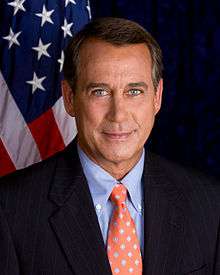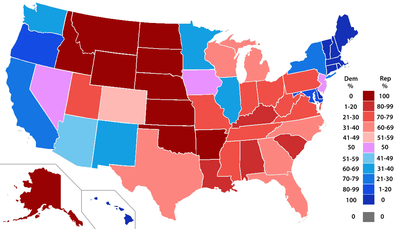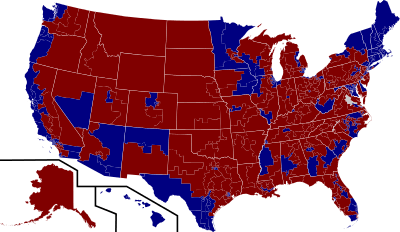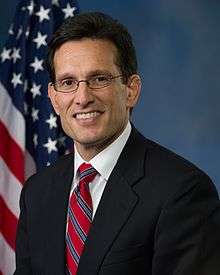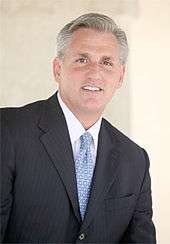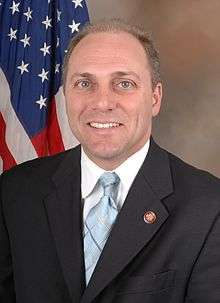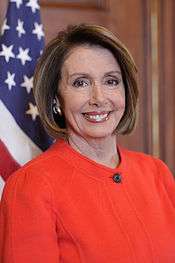113th United States Congress
The 113th United States Congress was a meeting of the legislative branch of the United States federal government, from January 3, 2013, to January 3, 2015, during the fifth and sixth years of Barack Obama's presidency. It was composed of the United States Senate and the United States House of Representatives based on the results of the 2012 Senate elections and the 2012 House elections. The seats in the House were apportioned based on the 2010 United States Census. It first met in Washington, D.C. on January 3, 2013, and it ended on January 3, 2015. Senators elected to regular terms in 2008 were in the last two years of those terms during this Congress.
| 113th United States Congress | |
|---|---|
112th ← → 114th | |
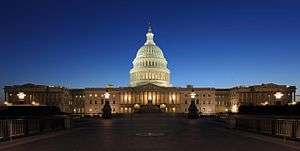 U.S. Capitol building at dusk as seen from the eastern side (2013) | |
| January 3, 2013 – January 3, 2015 | |
| Senate President | Joe Biden (D) |
| Senate President pro tem | Patrick Leahy (D) |
| House Speaker | John Boehner (R) |
| Members | 100 senators 435 members of the House 6 non-voting delegates |
| Senate Majority | Democratic |
| House Majority | Republican |
| Sessions | |
| 1st: January 3, 2013 – December 26, 2013 2nd: January 3, 2014 – December 16, 2014 | |
The Senate had a Democratic majority, while the House had a Republican majority. As of 2019, this is the last Congress in which Democrats controlled the Senate.
Major events

- January 4, 2013: Joint session to count the Electoral College votes for the 2012 presidential election.[2]
- January 20–21, 2013: Second inauguration of President Barack Obama.[3] The term began January 20, but because that was a Sunday, the Joint Committee on Inaugural Ceremonies scheduled the inauguration ceremony for the next day.[3]
- February 1, 2013: Senator Mo Cowan began his term after being appointed by Massachusetts Governor Deval Patrick. Serving alongside Senator Tim Scott of South Carolina, this marked the first time that two African Americans served concurrently in the Senate.[4]
- February 12, 2013: Joint session to hear the 2013 State of the Union Address.
- March 6–7, 2013: Senator Rand Paul led a filibuster of the nomination of John O. Brennan for Director of the Central Intelligence Agency with a 12-hour, 52-minute speech.
- June 5, 2013: The first media reports of Edward Snowden's surveillance disclosures surfaced in the media.[5]
- June 25, 2013: The Supreme Court struck down section 4(b) of the Voting Rights Act of 1965 in Shelby County v. Holder, ending the need for some counties and states to receive "preclearance" from the Justice Department before changing election laws.
- June 26, 2013: The Supreme Court struck down section 3 of the Defense of Marriage Act in United States v. Windsor, forcing the federal government to acknowledge same-sex marriages granted under the laws of states.
- July 16, 2013: The Senate reached a deal to allow some presidential nominations to come to a vote, avoiding the "Nuclear option" for filibuster reform.[6]
- September 24–25, 2013: Senator Ted Cruz delivered a 21-hour, 19-minute speech, one of the longest in Senate history, in opposition to the Affordable Care Act. Cruz's speech was not a filibuster, as it delayed no vote.[7]
- October 1–17, 2013: The United States federal government was shut down as most routine operations were curtailed after Congress failed to enact legislation appropriating funds for fiscal year 2014, or a continuing resolution for the interim authorization of appropriations for fiscal year 2014.
- October 3, 2013: United States Capitol shooting incident
- November 21, 2013: In a 52–48 vote, the Senate ended the use of the filibuster on all executive branch nominees, as well as on most judicial nominees. The filibuster remained in place for Supreme Court nominees and for legislation.[8]
- November 4, 2014: United States elections, 2014, including United States Senate elections, 2014 and United States House of Representatives elections, 2014.
Major legislation
Enacted
- March 7, 2013: Violence Against Women Reauthorization Act of 2013, Pub.L. 113–4
- March 13, 2013: Pandemic and All-Hazards Preparedness Reauthorization Act of 2013, Pub.L. 113–5
- March 26, 2013: 2013 United States federal budget (as Consolidated and Further Continuing Appropriations Act, 2013), Pub.L. 113–6
- June 3, 2013: Stolen Valor Act of 2013, Pub.L. 113–12
- August 9, 2013: Hydropower Regulatory Efficiency Act of 2013, Pub.L. 113–23
- August 9, 2013: Bipartisan Student Loan Certainty Act of 2013, Pub.L. 113–28
- September 30, 2013: Pay Our Military Act, Pub.L. 113–39
- November 27, 2013: Drug Quality and Security Act, Pub.L. 113–54
- December 26, 2013: National Defense Authorization Act for Fiscal Year 2014, Pub.L. 113–66
- January 17, 2014: Consolidated Appropriations Act, 2014, Pub.L. 113–76
- February 7, 2014: Agricultural Act of 2014, Pub.L. 113–79
- March 21, 2014: Homeowner Flood Insurance Affordability Act of 2014, Pub.L. 113–89
- April 3, 2014: Gabriella Miller Kids First Research Act, Pub.L. 113–94
- April 3, 2014: Support for the Sovereignty, Integrity, Democracy, and Economic Stability of Ukraine Act of 2014, Pub.L. 113–95
- May 9, 2014: Digital Accountability and Transparency Act (DATA), Pub.L. 113–101
- May 20, 2014: Kilah Davenport Child Protection Act, Pub.L. 113–104
- June 10, 2014: Water Resources Reform and Development Act, Pub.L. 113–121
- July 23, 2014: Workforce Innovation and Opportunity Act, Pub.L. 113–128
- August 1, 2014: Unlocking Consumer Choice and Wireless Competition Act, Pub.L. 113–144
- August 7, 2014: Veterans' Access to Care through Choice, Accountability, and Transparency Act of 2014, Pub.L. 113–146
- September 29, 2014: Preventing Sex Trafficking and Strengthening Families Act, Pub.L. 113–183
- October 6, 2014: IMPACT Act of 2014, Pub.L. 113–185
- November 26, 2014: Presidential and Federal Records Act Amendments of 2014, Pub.L. 113–187
- November 26, 2014: Government Reports Elimination Act of 2014, Pub.L. 113–188
- December 18, 2014: Death in Custody Reporting Act of 2013, Pub.L. 113–242
- December 18, 2014: Transportation Security Acquisition Reform Act, Pub.L. 113–245
- December 18, 2014: American Savings Promotion Act, Pub.L. 113–251
- December 18, 2014: Credit Union Share Insurance Fund Parity Act, Pub.L. 113–252
- December 18, 2014: EPS Service Parts Act of 2014 Pub.L. 113–263
- December 18, 2014: Venezuela Defense of Human Rights and Civil Society Act of 2014, Pub.L. 113–278
- December 18, 2014: Insurance Capital Standards Clarification Act of 2014, Pub.L. 113–279
Proposed
- 2014 United States federal budget: H.Con.Res. 25, S.Con.Res. 8
- Assault Weapons Ban of 2013 (S. 150) - Introduced after Sandy Hook Elementary School shooting
- Justice Safety Valve Act of 2013: S. 619, H.R. 1695
- Marketplace Fairness Act of 2013: (H.R. 684, S. 743) - Also known as the "Internet Sales Tax"
- Border Security, Economic Opportunity, and Immigration Modernization Act of 2013 (S. 744) - Also known as the immigration bill
Appropriations bills
Fiscal year 2014
Fiscal year 2014 runs from October 1, 2013, to September 30, 2014.[9]
Fiscal year 2015
Fiscal year 2015 runs from October 1, 2014, to September 20, 2015.[9]
- Agriculture, Rural Development, Food and Drug Administration, and Related Agencies Appropriations Act, 2015 (H.R. 4800) - considered in the House on June 11, 2014.[10] The bill would appropriate $20.9 billion.[11]
- Commerce, Justice, Science, and Related Agencies Appropriations Act, 2015 (H.R. 4660) - passed the House on May 30, 2014.[12] The total amount of money appropriated in the bill was $51.2 billion, approximately $400 million less than fiscal year 2014.[13]
- Department of Defense Appropriations Act, 2015 - considered in the House on June 18, 2014. The bill would provide funding of approximately $491 billion.[14]
- Energy and Water Development and Related Agencies Appropriations Act, 2015 (H.R. 4923; 113th Congress) (H.R. 4923) - The bill would appropriate $34 billion to the United States Department of Energy, the United States Army Corps of Engineers, and related agencies.[15]
- Legislative Branch Appropriations Act, 2015 (H.R. 4487) - passed in the House on May 1, 2014.[16] The bill would appropriate $3.3 billion to the legislative branch for FY 2015.[17]
- Military Construction and Veterans Affairs and Related Agencies Appropriations Act, 2015 (H.R. 4486) - passed the House on April 30, 2014.[18] The total amount appropriated by the introduced version of the bill is $71.5 billion.[17]
- Transportation, Housing and Urban Development, and Related Agencies Appropriations Act, 2015 (H.R. 4745 or "THUD") - passed the House on June 10, 2014.[19] The bill would appropriate $17 billion to the Department of Transportation and $40.3 billion to the Department of Housing and Urban Development.[20]
Party summary
- Resignations and new members are discussed in the "Changes in membership" section, below.
Senate
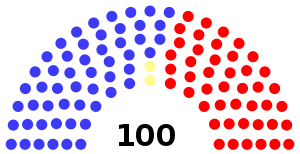
| Party (Shading indicates majority caucus) |
Total | Vacant | |||
|---|---|---|---|---|---|
| Democratic | Independent | Republican | |||
| End of previous Congress | 51 | 2 | 47 | 100 | 0 |
| Begin | 53 | 2 | 45 | 100 | 0 |
| June 3, 2013 | 52 | 99 | 1 | ||
| June 6, 2013 | 46 | 100 | 0 | ||
| October 31, 2013 | 53 | 45 | |||
| February 6, 2014 | 52 | 99 | 1 | ||
| February 9, 2014 | 53 | 100 | 0 | ||
| Final voting share | 55% | 45% | |||
| Beginning of the next Congress | 44 | 2 | 54 | 100 | 0 |
House of Representatives
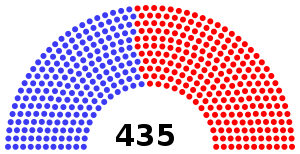
| Party (Shading indicates majority caucus) |
Total | Vacant | |||
|---|---|---|---|---|---|
| Democratic | Republican | ||||
| End of previous Congress | 191 | 240 | 431 | 4 | |
| Begin | 200 | 233 | 433 | 2 | |
| January 22, 2013 | 232 | 432 | 3 | ||
| April 9, 2013 | 201 | 433 | 2 | ||
| May 7, 2013 | 233 | 434 | 1 | ||
| June 4, 2013 | 234 | 435 | 0 | ||
| July 15, 2013 | 200 | 434 | 1 | ||
| August 2, 2013 | 233 | 433 | 2 | ||
| September 26, 2013 | 232 | 432 | 3 | ||
| October 18, 2013 | 231 | 431 | 4 | ||
| November 16, 2013 | 232 | 432 | 3 | ||
| December 10, 2013 | 201 | 433 | 2 | ||
| December 17, 2013 | 233 | 434 | 1 | ||
| January 6, 2014 | 200 | 433 | 2 | ||
| January 27, 2014 | 232 | 432 | 3 | ||
| February 18, 2014 | 199 | 431 | 4 | ||
| March 11, 2014 | 233 | 432 | 3 | ||
| June 24, 2014 | 234 | 433 | 2 | ||
| August 18, 2014 | 233 | 432 | 3 | ||
| November 4, 2014 | 201 | 234 | 435 | 0 | |
| Final voting share | 46.2% | 53.8% | |||
| Non-voting members | 6 | 0 | 6 | 0 | |
| Beginning of the next Congress | 188 | 247 | 435 | 0 | |
Leadership
Section contents: Senate: Majority (D), Minority (R) • House: Majority (R), Minority (D)
Senate
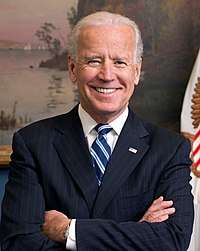
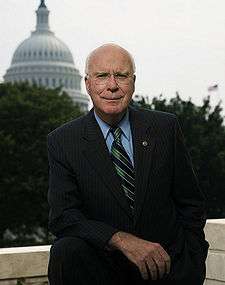
- President: Joe Biden (D)
- President pro tempore: Patrick Leahy (D)
Majority (Democratic) leadership
- Majority Leader and Caucus Chairman: Harry Reid
- Assistant Majority Leader (Majority Whip): Dick Durbin
- Democratic Caucus Vice Chairman and Policy Committee Chairman: Chuck Schumer
- Democratic Caucus Secretary: Patty Murray
- Senatorial Campaign Committee Chairman: Michael Bennet
- Policy Committee Vice Chairman: Debbie Stabenow
- Steering and Outreach Committee Chairman: Mark Begich
- Steering and Outreach Committee Vice Chairman: Jeanne Shaheen
- Chief Deputy Whip: Barbara Boxer
Minority (Republican) leadership
- Minority Leader: Mitch McConnell
- Assistant Minority Leader (Minority Whip): John Cornyn
- Republican Conference Chairman: John Thune
- Republican Conference Vice Chairman: Roy Blunt
- Senatorial Committee Chair: Jerry Moran
- Policy Committee Chairman: John Barrasso
- Deputy Whips: Roy Blunt, Richard Burr, Mike Crapo, Saxby Chambliss, Rob Portman, David Vitter, Roger Wicker
Majority (Republican) leadership
- Majority Leader: Eric Cantor, until August 1, 2014
- Kevin McCarthy, from August 1, 2014
- Majority Whip: Kevin McCarthy, until August 1, 2014
- Steve Scalise, from August 1, 2014
- Majority Chief Deputy Whip: Peter Roskam, until August 1, 2014
- Patrick McHenry, from August 1, 2014
- Republican Conference Chairwoman: Cathy McMorris Rodgers
- Republican Conference Vice-Chairwoman: Lynn Jenkins
- Republican Conference Secretary: Virginia Foxx
- Republican Campaign Committee Chairman: Greg Walden
- Policy Committee Chairman: James Lankford
- Campaign Committee Deputy Chairman: Lynn Westmoreland
Minority (Democratic) leadership
- Minority Leader: Nancy Pelosi
- Minority Whip: Steny Hoyer
- Assistant Democratic Leader: Jim Clyburn
- Democratic Caucus Chairman: Xavier Becerra
- Democratic Caucus Vice-Chairman: Joseph Crowley
- Democratic Campaign Committee Chairman: Steve Israel
- Steering and Policy Committee Co-Chairs: Rosa DeLauro (Steering) and Rob Andrews (Policy, until February 18, 2014); George Miller (Policy, from March 24, 2014)
- Organization, Study, and Review Chairman: Mike Capuano
- Senior Chief Deputy Minority Whip: John Lewis
- Chief Deputy Minority Whips: Terri Sewell, Keith Ellison, Jim Matheson, Ben R. Luján, Jan Schakowsky, Diana DeGette, G. K. Butterfield, Debbie Wasserman Schultz, Peter Welch
Members
Senate
Senators are listed by state, and the numbers refer to their Senate classes, In this Congress, Class 2 meant their term ended with this Congress, requiring re-election in 2014; Class 3 meant their term began in the last Congress, requiring re-election in 2016; and Class 1 meant their term began in this Congress, requiring re-election in 2018.
Alabama
Alaska
Arizona
Arkansas
California
Colorado
Connecticut
Delaware
Florida
Georgia
Hawaii
Idaho
Illinois
Indiana
Iowa
Kansas
Kentucky
Louisiana
Maine
Maryland
Massachusetts
Michigan
Minnesota
Mississippi
Missouri
|
Montana
Nebraska
Nevada
New Hampshire
New Jersey
New Mexico
New York
North Carolina
North Dakota
Ohio
Oklahoma
Oregon
Pennsylvania
Rhode Island
South Carolina
South Dakota
Tennessee
Texas
Utah
Vermont
Virginia
Washington
West Virginia
Wisconsin
Wyoming
|
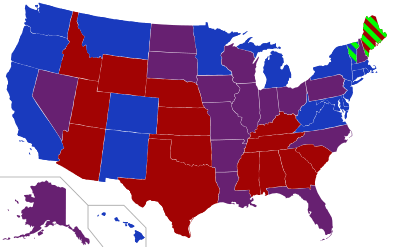 Party membership of the Senate, by state
2 Democrats
2 Republicans
1 Democrat and 1 Republican
1 Independent (caucuses with Democrats) and 1 Democrat
1 Independent (caucuses with Democrats) and 1 Republican Senate Majority Leaders  Democratic Leader Harry Reid 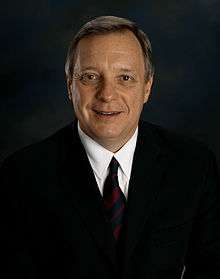 Democratic Whip Dick Durbin Senate Minority Leaders  Republican Leader Mitch McConnell .jpg) Republican Whip John Cornyn
|
House of Representatives
Changes in membership
Senate
| State (class) |
Vacator | Reason for change | Successor | Date of successor's formal installation[lower-alpha 1] |
|---|---|---|---|---|
| Massachusetts (2) |
John Kerry (D) |
Resigned February 1, 2013, to become U.S. Secretary of State.[22][23] Successor was appointed February 1, 2013, to continue the term. |
Mo Cowan (D) |
February 1, 2013 |
| New Jersey (2) |
Frank Lautenberg (D) |
Died June 3, 2013. Successor was appointed June 6, 2013, to continue the term. |
Jeffrey Chiesa (R) | June 10, 2013 |
| Massachusetts (2) |
Mo Cowan (D) |
Appointment expired July 16, 2013, following a special election.[24] Successor was elected June 25, 2013, to finish the term ending with this Congress. |
Ed Markey (D) | July 16, 2013 |
| New Jersey (2) |
Jeffrey Chiesa (R) |
Appointment expired October 31, 2013, following a special election.[25][26] Successor was elected October 16, 2013, to finish the term ending with this Congress. |
Cory Booker (D) | October 31, 2013[26] |
| Montana (2) |
Max Baucus (D) |
Resigned February 6, 2014, to become U.S. Ambassador to China. Successor was appointed February 9, 2014, to finish the term ending with this Congress. |
John Walsh (D) | February 11, 2014 |
House of Representatives
| District | Vacator | Reason for change | Successor | Date of successor's formal installation[lower-alpha 1] |
|---|---|---|---|---|
| Illinois 2nd | Vacant | Jesse Jackson Jr. (D) resigned November 21, 2012, near the end of the previous Congress for health reasons.[27] A special election was held April 9, 2013. |
Robin Kelly (D) | April 11, 2013[28] |
| South Carolina 1st | Vacant | Tim Scott (R) resigned January 2, 2013, near the end of the previous Congress, when appointed to the Senate.[29] A special election was held May 7, 2013. |
Mark Sanford (R) | May 15, 2013[30] |
| Missouri 8th | Jo Ann Emerson (R) |
Resigned January 22, 2013, to become president and CEO of the National Rural Electric Cooperative Association.[31] A special election was held June 4, 2013. |
Jason Smith (R)[32] | June 5, 2013[33] |
| Massachusetts 5th | Ed Markey (D) |
Resigned July 16, 2013, having been elected to the United States Senate in a special election. A special election was held December 10, 2013. |
Katherine Clark (D)[34] | December 12, 2013 |
| Alabama 1st | Jo Bonner (R) |
Resigned August 2, 2013, to become a vice chancellor in the University of Alabama System. A special election was held December 17, 2013. |
Bradley Byrne (R) |
January 7, 2014 |
| Louisiana 5th | Rodney Alexander (R) |
Resigned September 26, 2013, to become the secretary of the Louisiana Department of Veterans Affairs. A special election was held November 16, 2013.[35] |
Vance McAllister (R) | November 21, 2013[36] |
| Florida 13th | Bill Young (R) |
Died October 18, 2013. A special election was held March 11, 2014. |
David Jolly (R) | March 13, 2014[37] |
| North Carolina 12th | Mel Watt (D) | Resigned January 6, 2014, to become head of the Federal Housing Finance Agency. A special election was held November 4, 2014. |
Alma Adams (D) | November 12, 2014 |
| Florida 19th | Trey Radel (R) | Resigned January 27, 2014 following a conviction for cocaine possession.[38] A special election was held June 24, 2014. |
Curt Clawson (R) | June 25, 2014 |
| New Jersey 1st | Rob Andrews (D) |
Resigned February 18, 2014, to take a position at a Philadelphia law firm.[39] A special election was held November 4, 2014. |
Donald Norcross (D) |
November 12, 2014 |
| Virginia 7th | Eric Cantor (R) |
Resigned August 18, 2014 following his primary defeat. A special election was held November 4, 2014. |
Dave Brat (R) |
November 12, 2014 |
Committees
[Section contents: Senate, House, Joint ] Listed alphabetically by chamber, including Chairperson and Ranking Member.
Senate
|
|
House of Representatives
|
|
Joint committees
- Economic: Kevin Brady, Amy Klobuchar
- Inaugural Ceremonies (Special): Chuck Schumer, Lamar Alexander
- The Library: Gregg Harper, Chuck Schumer
- Printing: Chuck Schumer, Gregg Harper
- Taxation: Max Baucus, then Ron Wyden, Dave Camp
Caucuses
Employees
Legislative branch agency directors
- Architect of the Capitol: Stephen T. Ayers
- Attending Physician of the United States Congress: Brian Monahan
- Comptroller General of the United States: Eugene Louis Dodaro
- Director of the Congressional Budget Office: Keith Hall
- Librarian of Congress: James H. Billington
- Public Printer of the United States: Davita E. Vance-Cooks
Senate
- Chaplain: Barry C. Black (Seventh-day Adventist)
- Curator: Diane K. Skvarla, until January 27, 2014
- Melinda Smith, starting January 27, 2014
- Historian: Donald A. Ritchie
- Librarian: Leona I. Faust
- Parliamentarian: Elizabeth MacDonough
- Secretary: Nancy Erickson
- Secretary for the Majority: Gary B. Myrick
- Secretary for the Minority: David J. Schiappa, until August 1, 2013
- Laura C. Dove, from August 1, 2013
- Sergeant at Arms: Terrance W. Gainer, until May 2, 2014
- Andrew B. Willison, from May 2, 2014
House of Representatives
- Chaplain: Patrick J. Conroy (Roman Catholic)
- Chief Administrative Officer: Daniel J. Strodel, until January 6, 2014
- Ed Cassidy, from January 6, 2014
- Clerk: Karen L. Haas
- Historian: Matthew Wasniewski
- Inspector General: Theresa M. Grafenstine
- Parliamentarian: Thomas J. Wickham Jr.
- Reading Clerks: Susan Cole and Joseph Novotny
- Sergeant at Arms: Paul D. Irving
See also
Elections
- United States elections, 2012 (elections leading to this Congress)
- 2012 United States presidential election
- United States Senate elections, 2012
- United States House of Representatives elections, 2012
- United States elections, 2014 (elections during this Congress, leading to the next Congress)
- United States Senate elections, 2014
- United States House of Representatives elections, 2014
Membership lists
Notes
- This is the date the member was seated or an oath administered, not necessarily the same date her/his service began.
References
- Bailey, Holly (October 1, 2013). "Federal shutdown closes Statue of Liberty and other top tourist sites". Yahoo News. Retrieved October 26, 2013.
- H.J.Res. 122
- "Joint Committee on Inaugural Ceremonies". Inaugural.senate.gov. Retrieved January 3, 2013.
- Weigel, David. "For the First Time Ever, We'll Have Two Black Senators Serving at the Same Time". Slate. The Slate Group. Retrieved February 15, 2020.
- Volz, Dustin (December 31, 2013). "Everything We Learned From Edward Snowden in 2013". National Journal. Retrieved January 25, 2015.
- "McCain claims Senate leaders have deal to avert showdown over Obama nominees". FoxNews. Retrieved July 16, 2013.
- Peters, Jeremy W. (September 25, 2013). "After 21 Hours, Cruz Ends Senate Speech". the New York Times. Retrieved September 25, 2013.
- "In Landmark Vote, Senate Limits Use of the Filibuster". New York Times.
- Heniff Jr., Bill (November 26, 2012). "Basic Federal Budgeting Terminology" (PDF). Congressional Research Service. Retrieved January 9, 2014.
- "H.R. 4800 - All Actions". United States Congress. Retrieved June 11, 2014.
- Cox, Ramsey; Marcos, Cristina (June 11, 2014). "Wednesday: School is out but Congress considers student loans, lunches". The Hill. Retrieved June 11, 2014.
- "H.R. 4660 - All Actions". United States Congress. Retrieved May 28, 2014.
- Marcos, Cristina (May 30, 2014). "House passes third '15 appropriations bill". The Hill. Retrieved May 30, 2014.
- Marcos, Cristina (June 16, 2014). "This week: Spending bills, VA reform, leadership races". The Hill. Retrieved June 16, 2014.
- Marcos, Cristina (July 7, 2014). "This week: Sportsmen's bill, appropriations". The Hill. Retrieved July 10, 2014.
- "H.R. 4487 - All Actions". United States Congress. Retrieved May 2, 2014.
- Marcos, Cristina (April 25, 2014). "Next week:Appropriations season begins". The Hill. Retrieved May 1, 2014.
- "H.R. 4486 - All Actions". United States Congress. Retrieved May 1, 2014.
- "H.R. 4745 - All Actions". United States Congress. Retrieved June 9, 2014.
- Marcos, Cristina (June 10, 2014). "House passes fourth '15 appropriations bill". The Hill. Retrieved June 11, 2014.
- Newlin, Eliza. "Res. Com. Pedro Pierluisi (D-PR, At-large) - The Almanac of American Politics". Nationaljournal.com. Retrieved November 9, 2012.
- Murphy, Matt (January 28, 2013). "US senate special election to replace John Kerry will be June 25". metrowestdailynews.com. Cambridge Chronicle & Tab. Retrieved January 29, 2013.
- Landler, Mark (December 21, 2012). "Kerry Named for the Role of a Lifetime". NYTimes.com. The New York Times. p. A1. Retrieved January 8, 2013.
- Seelye, Katharine (January 30, 2013). "Governor Names Longtime Friend to Kerry's Seat". NYTimes.com. The New York Times. Retrieved January 30, 2013.
- Santi, Angela (June 4, 2013). "Chris Christie: Special Election To Be Held In October For Frank Lautenberg's Seat". AP. The Huffington Post. Retrieved June 4, 2013.
- Cramer, Ruby (October 23, 2013). "Cory Booker To Be Sworn In To The Senate On Halloween". Buzzfeed. Retrieved October 23, 2013.
- O'Keefe, Ed (November 21, 2012). "Jesse Jackson Jr. resigns: Read his resignation letter". washingtonpost.com. The Washington Post.
- "Kelly, Robin L." Biographical Directory of the United States Congress.
- 2012 Congressional Record, Vol. 158, Page H7467 (December 30, 2012)
- Camia, Catalina (May 14, 2013). "Mark Sanford to be sworn in Wednesday". USAToday.com. USA Today. Retrieved June 5, 2013.
- "Missouri rep leaving Congress in February". cnn.com. CNN. December 3, 2012.
- "2013 Missouri House 8th District Special Election". Politico.com. Politico. June 4, 2013. Retrieved June 4, 2013.
- "Jason Smith sworn in as newest Missourian in Congress". stltoday.com. St. Louis Post-Dispatch. June 6, 2013. Retrieved June 6, 2013.
- Isenstadt, Alex (December 10, 2013). "Katherine Clark wins Massachusetts special".
- McGaughy, Lauren (August 7, 2013). "Rodney Alexander to join Jindal administration, departure from Congress will trigger special election". The Times-Picayune. Retrieved August 8, 2013.
- Alpert, Bruce (November 21, 2013). "Vance McAllister's first visit to Washington is to take a seat in Congress". The Times-Picayune. Retrieved November 23, 2013.
- http://www.wtsp.com/news/topstories/article/360110/250/Jolly-to-be-sworn-in-Thursday-afternoon%5B%5D
- Sherman, Jake (January 27, 2014). "Trey Radel to resign House seat". politico.com. Retrieved January 27, 2014.
- Ostermeier, Eric (February 4, 2014). "Andrews Exits US House with Top 10 Longest Tenure in New Jersey History". Retrieved February 27, 2014.
- Ramshaw, Emily (June 26, 2011). "Joaquin Castro: The 113th Congress and New District Brings Positive Change For Texas". NYTimes.com. The New York Times.
- Peters, Jeremy W. (December 9, 2012). "113th Congress: This Time, It's Out With the New". NYTimes.com. The New York Times. Retrieved December 10, 2012.
- "Videos of House of Representatives Sessions for the 113th Congress from www.C-SPAN.org".
- "Videos of Senate Sessions for the 113th Congress from www.C-SPAN.org".
- "Videos of Committees from the House and Senate for the 113th Congress from www.C-SPAN.org".
- House of Representatives Session Calendar for the 113th Congress, 2013 calendar (PDF).
- House of Representatives Session Calendar for the 113th Congress, 2014 calendar (PDF).
- Senate Session Calendar for the 113th Congress (PDF).
- Congressional Pictorial Directory for the 113th Congress (PDF).
- Official Congressional Directory for the 113th Congress
External links
| Wikisource has original text related to this article: |
- Bills and Resolutions:
- Roll Call Votes:
